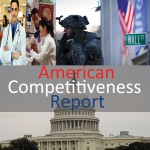In the news business, April 1 is always a tricky day. Spoof stories abound.
No more so than today, when reports announcing real progress on immigration reform over the weekend might require a double, and then triple, check to see if it was indeed true.
Senators from the so-called Gang of Eight and lawmakers in the House are moving forward to come up with new laws that may give up to 11 million undocumented people in the U.S. a path to legal status and citizenship. Recent accord between business groups and labor indicate there is as good of a chance as there has been in a very long time. As always, small policy details can trip up grand plans, as Politico points out in a Monday story “Next immigration hurdle: Citizenship’s fine print.”
Still, the progress is important for two reasons, both tied to improving American competitiveness.
Effective bipartisan deal-making is sorely needed on a range of policy issues that get played for their knee-jerk political or emotional value. Immigration is just one of them. Others such as healthcare or even the national debt also require this kind of willingness to break a cycle of dysfunction in order to come up with some big-tent fixes. While actual progress is crucial, the appearance of progress matters too.
Such an immigration deal would mostly help people working hourly-wage type positions illegally, yet the visa quota system for the world’s highly skilled workers is an urgent issue for improving American competitiveness. America should aspire to be the top choice for the world’s most talented, and motivated, workers.
The U.S. is facing a STEM worker shortfall in approximately 230,000 jobs at a time when American graduates will not be coming into the work force in enough number to fill these positions. Meanwhile, foreign graduates of advanced degree programs still struggle to get permission to stay in the U.S. after their studies, effectively taking their valuable skills abroad. Taking action on the Senate Startup Act 3.0, introduced in February by a bipartisan group of Senators, should also be a priority this spring. The Immigration Innovation Act is another remedy that, for example, could quickly boost the number of H-1B visas while also allocating funding for worker retraining.
What the ultimate solution is depends on a lot of difficult conversations behind closed doors, overcoming the sort of politicking that has undone other meaningful opportunities during the past few years. But it is a good sign that, especially on April 1, that building a consensus around immigration reform that will improve America’s future is being taken seriously again.
Check out ASP’s White Paper on American Competitiveness that discusses these issues further:
Read our Blogs and Listen to our other podcasts in the series:
Podcasts:
American Competitiveness – Interview with former Gov. Christine Todd Whitman
Adm. William Fallon (Ret.) on sequestration and American Competitiveness
Sequestration – what’s happening in the States
American Competitiveness and National Security – Podcast
Blog Posts:
Making the case for U.S. leadership in the Pacific
Pentagon – Rare Metals Shortfalls is a National Security Challenge
More Fiscal Focus From The Chairman Of The Joint Chiefs
America’s Long-Term Test: Fusion Power
Moment near for a ‘grand bargain’ on the debt?
Veteran Unemployment and American Competitiveness
Living with uncertainty in the defense industry
Harvard Business School survey finds more pessimism about U.S. competitiveness
Competitiveness – Education: What most schools don’t teach

![SOLiStock_000004254063Large[1]](http://americansecurityproject.org/wp-content/uploads/2013/04/SOLiStock_000004254063Large1-150x150.jpg)


